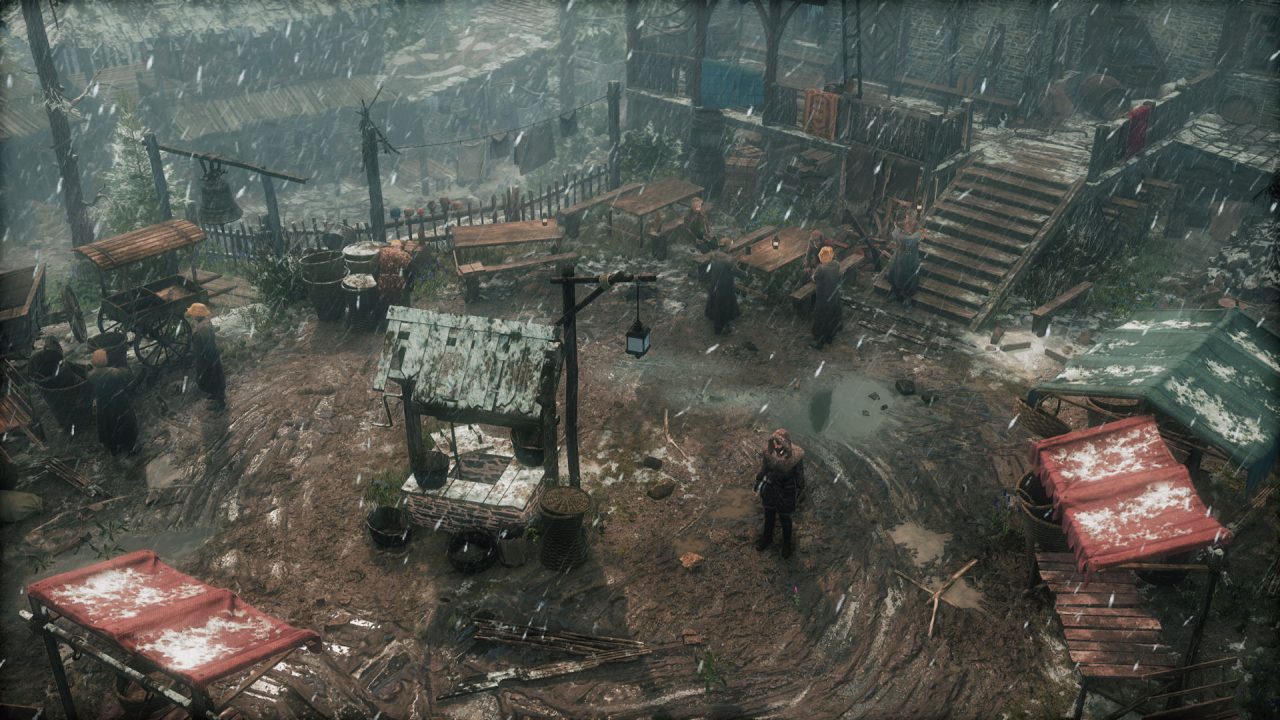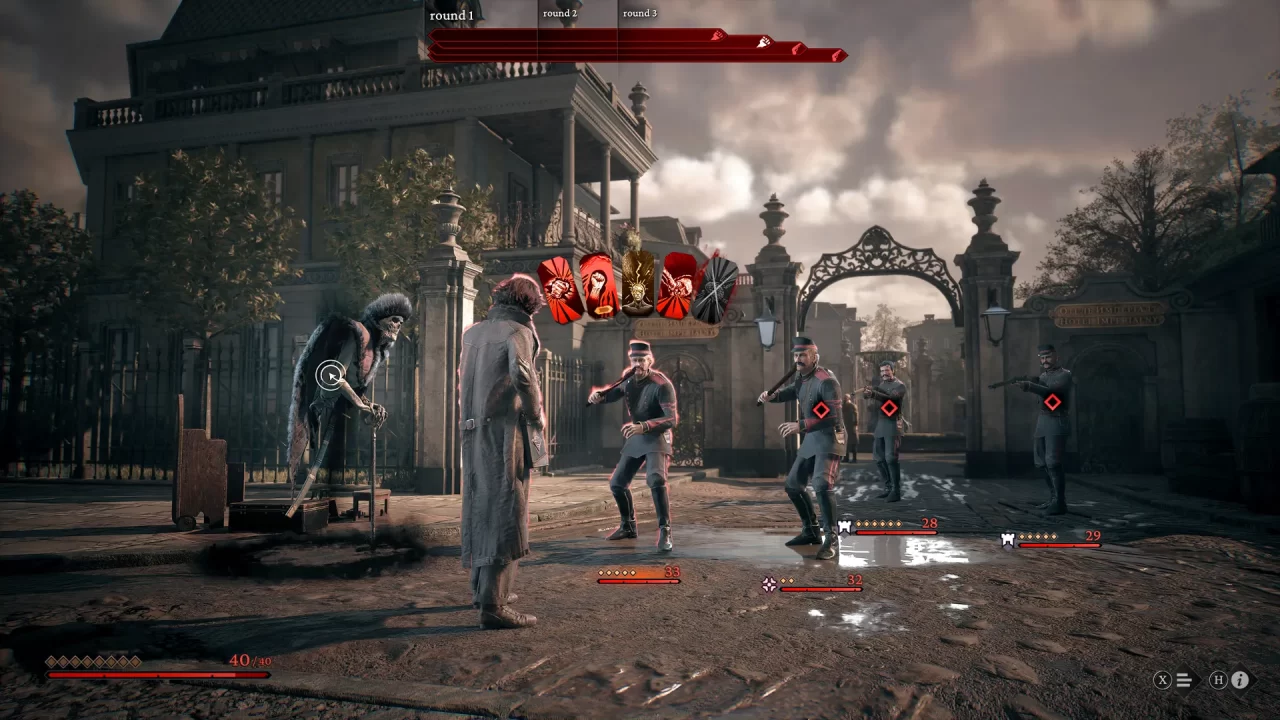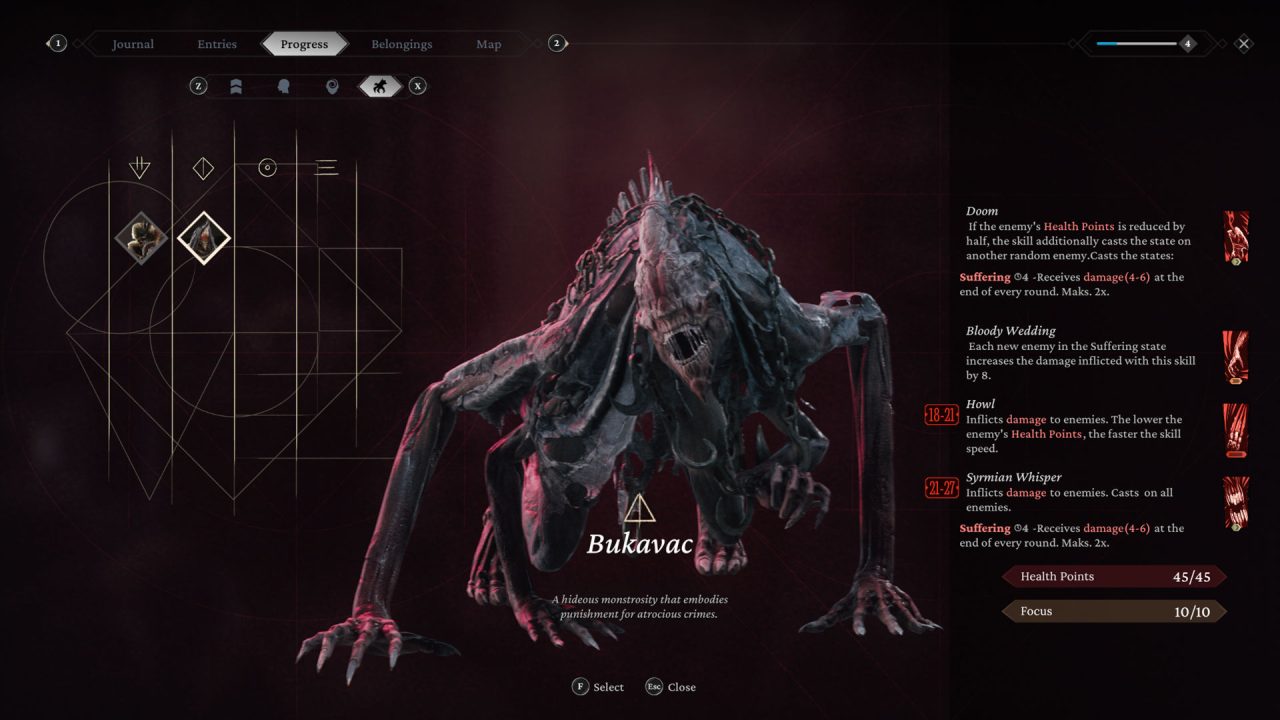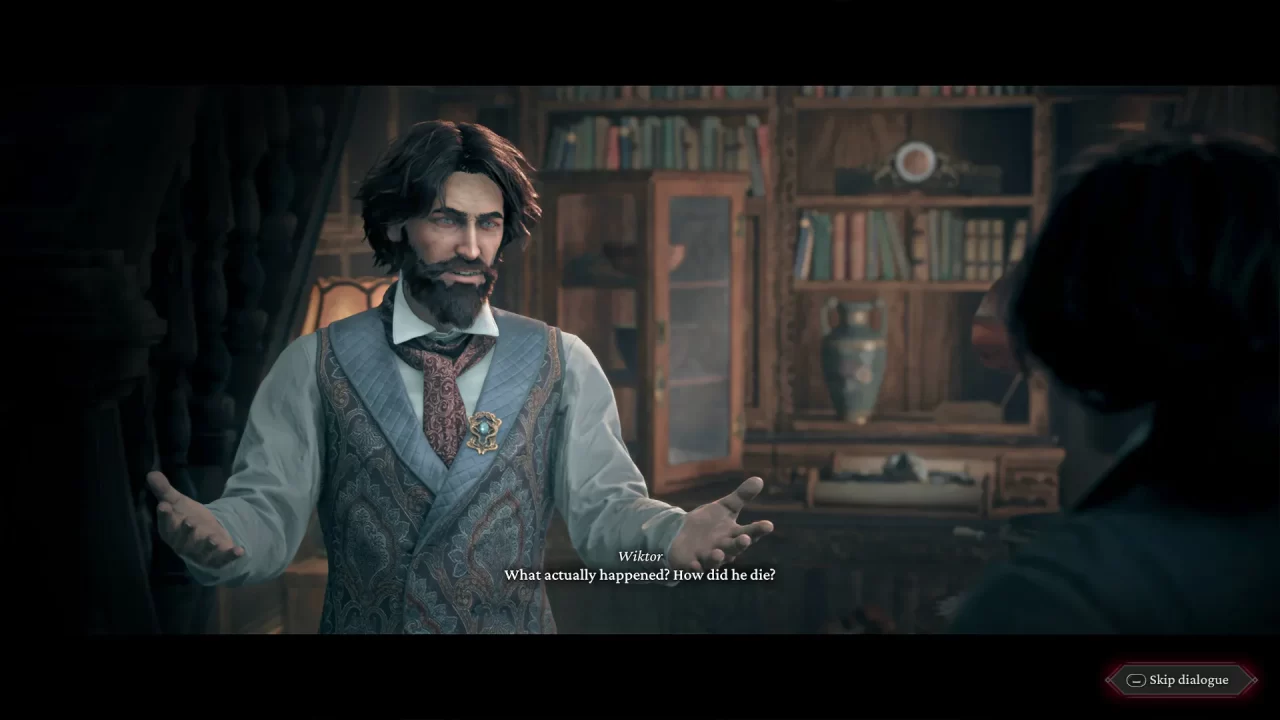Sometimes after a long, hard week at work or home, all we want to do is kick back and relax with a quick game session: maybe a few runs on Slay the Spire or a few rounds on Persona grinding for that next creature fusion. Other times, the idea of a meaty, involved RPG narrative is just what’s needed. Those times where we’ve ordered the pizza in, got a drink (or two) to hand and turned the lights down low. The Thaumaturge, developed by Fool’s Theory, is of the latter variety, and takes itself pretty seriously in its aims. This commitment to exploring a dark, personal story of identity is mostly successful, taking place in a richly detailed world that intersects with key events of an alternative European history.
The Thaumaturge is set in early twentieth-century Poland, and follows Wiktor Szulski, a thaumaturge who makes his way back to the Russian-occupied city of Warsaw after learning of a family tragedy. As a thaumaturge, he is able to read emotional imprints on objects and explore the psyches and mental flaws of people he interacts with. He is also able to recognize and bind “salutors,” metaphysical creatures of different types which attach themselves to individuals with such flaws. His own salutor, Upyr, is the prideful spirit of an old soldier he encountered when he was a child and who acts as a muse to him throughout the game. As he explores his family’s past and the factions that make up the city, Wiktor is drawn into myriad plots involving the future of Warsaw. Soon he is entangled in mysteries involving a Warsaw-bound pilgrim, Rasputin, the socialist rebels of the city, and the Russian Tsar.
The Thaumaturge‘s story is uncompromising, doubling down on historical perspectives of personal liberty and self-determination against a background of foreign partition and class tension. It is worth noting that the historic inequalities of the era, and how these are replicated in character representation, are used throughout the narrative. The game does not shy away from this. The supernatural element of the story is quite subtle, woven into this tapestry as an additional veneer to the plots taking place. None of the main characters, including Wiktor, are traditionally heroic or altruistic, but they all commit to their ideals and desires with bluster. It is a brave decision to drop the player into such a paranoid and, at times, hopeless setting, but it does add weight to the decisions that open up. Just be prepared to accept a bleak and brittle narrative where there are very few winners and many losers.
As the story develops, the player is introduced to a narrative design system whereby Wiktor draws conclusions from observations he makes as he interacts with the world. Using his powers, he can draw out memories and histories from objects that offer new story or character insights. Not all details are available at once, and some only become clear once the links to his salutors develop. This then allows for different conversational options and alters how characters perceive and react to Wiktor in dialogue choices. It is not a full investigative minigame, but it does serve as an ambitious, thematic way to pick up breadcrumbs of the story.
The system is not always smooth, and certain dialogue starts or actions feel abrupt or are full of non-sequiturs, depending on the order of clues gathered. And be prepared for a lot of reading — the sheer number of observations quickly fills up through the mid-game. Merely passing through a map zone on the way to a quest marker can result in a half-dozen observation prompts popping up, which kills the pace somewhat. They’re not always connected to the same conclusion either, so it slows the game down further when trying to find the story string it relates to in the journal. As a result, it sometimes feels like conclusions happen arbitrarily rather than through careful observations or clever guesswork.
At points during the story, scripted combat encounters occur, and this is where the majority of the salutors’ abilities come into play. Wiktor does not level up or gain statistical improvements in the traditional manner. Rather, the combat systems revolve around unlocking and slotting different abilities and status effects as he learns more about his salutor bonds and gains experience in the world through exploration and combat. There’s a good mix of offensive and passive abilities, as well as actions that break down the Focus of the enemy. Focus is a sort of mental armor that Wiktor and most enemies possess, and reducing this allows for more devastating attacks to be made. Different enemies also have resistances to different salutors, so part of the combat pattern is regularly cycling through Wiktor’s collection, matching up the right salutor to the enemy it will affect the most.
There are few direct healing powers and no healing items, so a good chunk of combat involves managing damage over time and abilities which allow the thaumaturge to heal himself at the cost of his enemies’ health. All these actions are coded to specific speeds, and the game uses a turn bar to indicate how quickly different actions will be activated. As Wiktor (and his selected salutor) are the only controllable characters, linked combinations and strategies become apparent quickly. All-in-all, combat is effective and quite cinematic, as the camera switches to a more closed-in version of the action, with damage and status icons painted in stylized red and gold which suits the sort of internal and external conflict taking place. Control is well-mapped both for controller and keyboard, and the UI presents the information for health, abilities and effects clearly or with expanded selection prompts.
Battles involving salutors offer a flair all their own. When these conflicts occur, the animated salutor looms large in the background of the combat, presiding over a range of spectral enemies. Their health is tied to these enemies, and most battles consist of multiple waves of replacements that must be defeated. In an additional twist, they each have their abilities, such as damaging Wiktor directly or boosting their allies when their turn arrives. These battles show off the otherness and painstaking design of the salutors, and they run the gamut from the ghostly to the mythologically-inspired to just plain Lovecraftian. They suit the dark themes and the tone well and plenty have a basis in the esoteric beings of folklore and tradition of the real world. The brutal Bukovac doubles down on savage attacks that generate damage over time, whilst Upyr offers abilities which restore Wiktor’s health when an enemy is damaged, for example.
But these fights are few and far between: overall combat variety is rather limited outside of them. All direct foes are humans, with very similar animations and attack patterns. Combat complexity is generated more through increased hit points, increased Focus, and an increased number of enemies rather than a wider range of enemy types and abilities. Combat therefore becomes more repetitive as the game goes on, despite Wiktor having an increasing number of abilities to try.
Although The Thaumaturge does not begin in Warsaw, the city soon becomes the star of The Thaumaturge. From the worn-down tenements of the back streets of Powiśle to the grand ballrooms and upper-class manors of Praga, there is a lived-in sense of graphical detail across Warsaw and its environs that underscores the commitment to realism. Every district is beautifully rendered, from piles of construction materials near the unfinished tramlines and sewers to washing lines hanging over the muddy streets. The use of a day/night cycle and some pretty shadow casting and texture details add to this ambiance. The feeling of a broken city at the turn of the twentieth century is captured well, in all its dark, brooding glory through the relatively fixed camera view. Maps are not as open as they might first appear, and most accessible areas are a series of smaller connected zones. The game switches smoothly to a third-person view for both dialogue and combat and these are generally well-directed and evocative. Whilst character models are not as sharp as the heavyweights of the genre, lip-syncing and facial expressions are quite effective as are some nice period touches on clothing and accessories.
All dialogue in the game is fully voiced. However, voice inflection and tone feel flat and sombre throughout, and whilst this matches the tone and themes of the game, it makes it difficult to discern character personalities or keep them memorable. A few, such as Wiktor’s boyhood friend Abaurycy and fellow thaumaturge Ariel Rofe do stand out, but this is more because they push the writing outside of paranoid brooding than it is the performance of the voice-over. I would consider it a few steps above its Eurozone cousins (looking at you Elex, Risen), but not in all character cases. The musical score is quite minimal: lots of strained violin, isolated piano and ambient, droning cellos during exploration. Again, this matches the dour tone and theme, but when it does shift in gear, such as in battle, it draws on Slavic themes and local traditions which adds a rare energy and balletic quality to the combat.
In keeping with its sharp focus on narrative and place, The Thaumaturge offers very little in the way of further progression systems. There is no usable inventory and the game does not feature any equipment systems or weapon upgrades. This keeps the combat system lean, but it also exacerbates the invariable combat: Wiktor punches and shoots his way around from the first to the final combat. It’s not a long game either, depending on difficulty selected and if the main story path is prioritized. There are plenty of sidequests to find though, and these are the main ways to generate additional experience as well as explore the different factions and locations. Some sidequests lead to additional salutors to expand Wiktor’s combat arsenal, whilst others have an impact on the overall direction of the story if completed. There are also sketch pictures and period-appropriate musical tracks to find throughout the city, which add a little whimsy and variety to the bleak journey.
The Thaumaturge is an unsettling RPG, offering a branching story set in an early twentieth-century Warsaw from the perspective of a flawed, supernatural warrior. It is a dark and harrowing journey, fully committed to exploring the conflicting desires of the people in the city of Warsaw; there is little whimsy, less humor, and no distraction from this goal. This requires an equal commitment from the gamer to this flavour of the genre — there is no grinding, karaoke mini-games or creature-collecting distractions here: your prince is in another castle. The game narrative and combat systems build on these dark themes, cleverly framing them in how Wiktor uses his abilities as a thaumaturge. Even if the multiple story paths sometimes buckle under their ambitious weight, and combat can become a little too lacking in variety, this is a person, a city and a time worth visiting and learning from for those it ensnares. Just remember to bring pizza, a drink (or two), and turn the lights down low. Very low.






